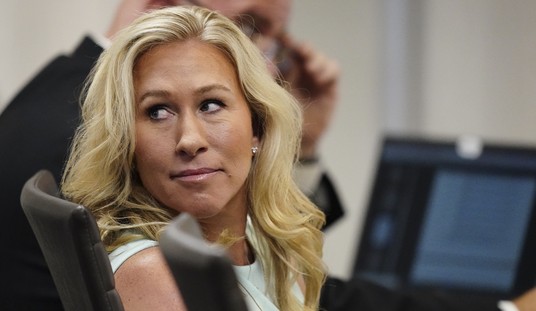Or, perhaps more accurately, just say no to another round of state bailouts. Sarah Palin takes note of a WSJ report over the weekend that passed with little notice about Republican efforts to oppose a push from states in fiscal crisis for yet another bailout to follow the Porkulus-funded state grants that allowed them to paper over budget gaps without fixing their underlying spending problems, most of them tied to massive liabilities in public-worker pensions:
The new Republican House leadership, whose party benefited in November from public antipathy toward the bailout of banks, is moving to avoid a federal bailout of state and local pension funds.
Congress has little authority over, or responsibility for, state and local public-employee pensions. But with pension liabilities increasingly stressing state and municipal finances, the prospect that the problem will end up in Washington’s lap has some academics and politicians urging that the federal government move preemptively.
The latest wrinkle: A bill introduced last week by three prominent House Republicans to deny states and localities the ability to sell tax-exempt bonds—the lifeblood for many governments—unless they report their pension-fund liabilities to the Treasury Department. The federal tax-free status of interest on municipal bonds helps generate demand for the bonds and lowers government borrowing costs.
The goal, the congressmen say, is to get a better handle on funding woes of public pensions, which they say are not always forthcoming about the true extent of their financial exposure.
Palin rightly diagnoses the problem as a political failure in the states rather than a short-term consequence of the economic woes over the past two years, and insists that the solutions will have to come from the states rather than the federal government:
Instead of coming to D.C. cap in hand asking for more “free” money, they should follow the example of their more prudent sister states and take the necessary steps to sort out their own finances. They must start by reforming their insolvent pension systems. Many states have multi-billion dollar unfunded pension liability problems that they have refused to address for many years. They’ve deferred their spending problems, assuming the problem deferred would be an issue avoided; instead, it’s resulted in a crisis invited. These states still won’t reform their costly defined benefit systems for fear of offending the powerful public sector unions. Sooner or later, their pension systems will collapse unless they do what states like Alaska did, which is to swap unsustainable defined benefits, which are more like glorified Ponzi schemes, for a more prudent defined contributions system.
My home state made the switch from defined benefits to a defined contribution system, and as governor, I introduced a number of measures to build on that successful transition, while also addressing the issue of the remaining funding shortfall by prioritizing budgets to wrap our financial arms around this too-long ignored debt problem. When my state ran a surplus because we incentivized businesses, I didn’t spend it on fun and glamorous pet projects for lawmakers – though that would have made me quite popular with the earmark crowd. In fact, I vetoed more excessive spending than any governor in our state’s history, and I used the state’s surplus to bring our financial house in order by paying down our unfunded pension plans that some other governors wanted to ignore. This fiscal prudence didn’t make me popular with the state legislature. In addition to vetoing hundreds of millions of dollars in wasteful spending, I put billions of dollars into savings accounts for future rainy days, much like most American families do in responsibly planning for the future. I also enacted a hiring freeze and brought the education budget under control through a commitment to forward-funding. I returned much of the surplus back to the people (it was their money to start with!) through tax relief and energy rebates. I had proven as the mayor of the fastest growing city in the state that tax cuts incentivize business growth, and though the state legislature overrode some of my veto cuts and thwarted an additional tax relief request of mine, the public was supportive of efforts to rein in its government.
It’s one thing to veto spending and reduce the size of government when your state is broke. I did it when my state was flush with revenue from a surplus – though I had to fight politicians who wanted to spend like there was no tomorrow. It’s not easy to tell people no and make them act fiscally responsible and cut spending when the money is rolling in and your state is only 50 years shy of being a territory and everyone is yelling at you to spend while the money is there to build. My point is, if I could fight this fight in Alaska at a time of surplus, then other governors can and should be able to do the same at a time when their states are facing bankruptcy and postponing this fight is no longer an option.
So, let’s not continue to reward irresponsible political behavior. Instead of handing out more federal dollars, let’s give the governors of these debt-ridden states some free advice. Shake off the pressure from public sector unions to cave on this issue. Put up with the full page newspaper attack ads, the hate-filled rhetoric, and the other union strong arm tactics that I, too, had to put up with while fighting those who don’t believe a state needs to live within its means. Stand up to the special interests that are bankrupting your states. You may not be elected Miss Congeniality for fighting to get your fiscal houses in order; but in the long run, the people who hired you to do the right thing will appreciate your prudence and fiscal conservatism.
That process should have started in early 2009, when the budget gaps opened by economic recession became acute in most states. Some had it worse than others. In California, public pensions create an overwhelming amount of liabilities, while their hyperprogressive tax system created an amplified shortfall in revenue when the national and state economies cratered. Other states had similar problems to lesser degrees, with unrealistic public pensions and spending set in relatively flush times, and little political will to prioritize and downsize government.
Instead, the Obama administration and Congress structured the stimulus bill to give states billions of dollar in bloc grants, ostensibly to “save and create jobs.” They did so — by saving bureaucratic jobs. They applied the money to their budget gaps to avoid the downsizing needed, basically kicking the can down the road for a year and wasting billions of dollars while doing so. That solved none of the structural problems that created these state-level crises, and once again we’re seeing them threaten the economic health of each state and the nation.
We do not need a federal supply of the hair of the dog. It’s time to tell the states to deal with their own mismanagement and to take responsibility for their own budgetary crises. The party is long since over, and the hangover gets worse with avoidance and bailouts.







Join the conversation as a VIP Member